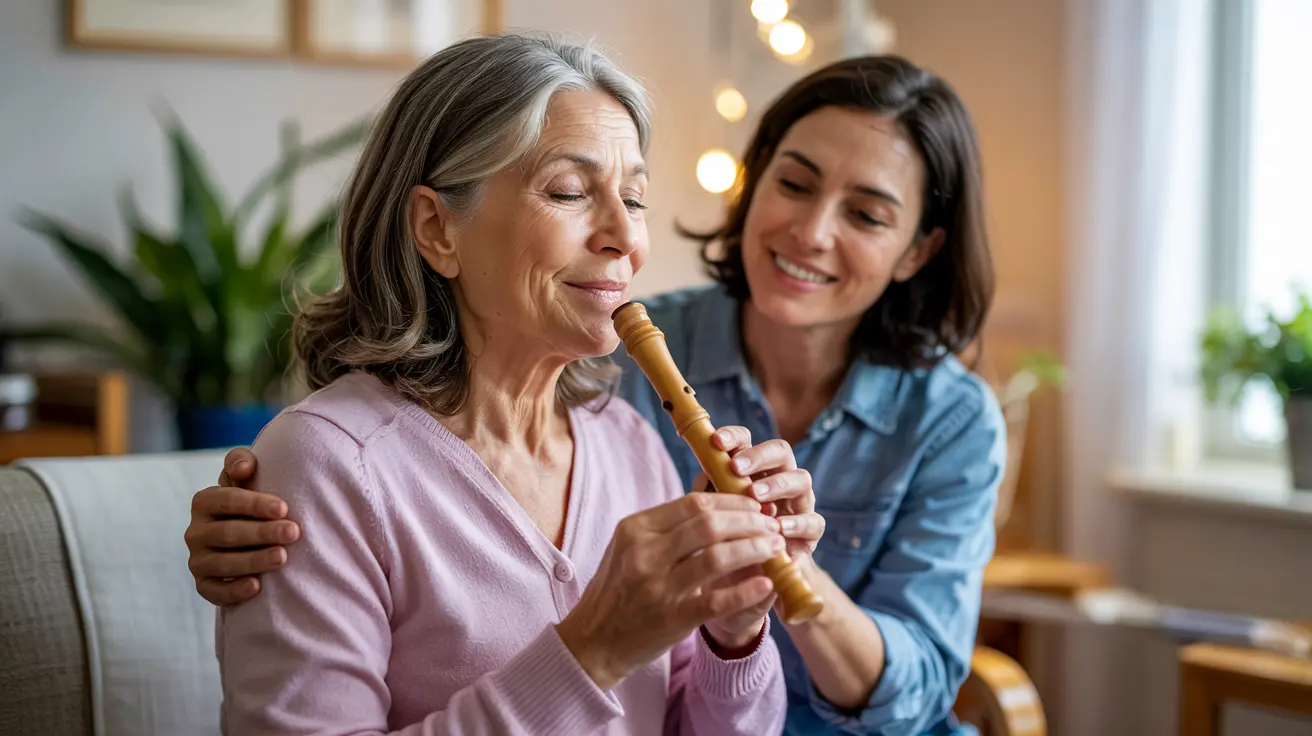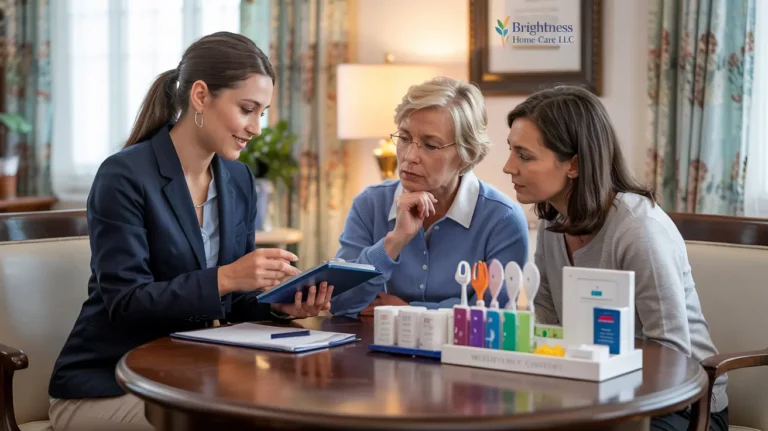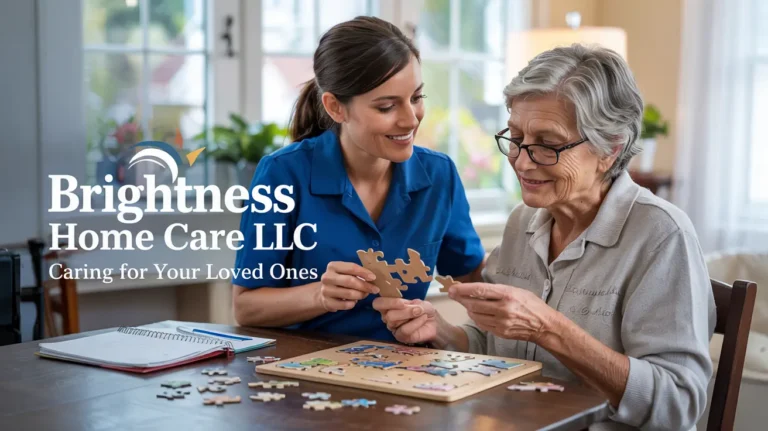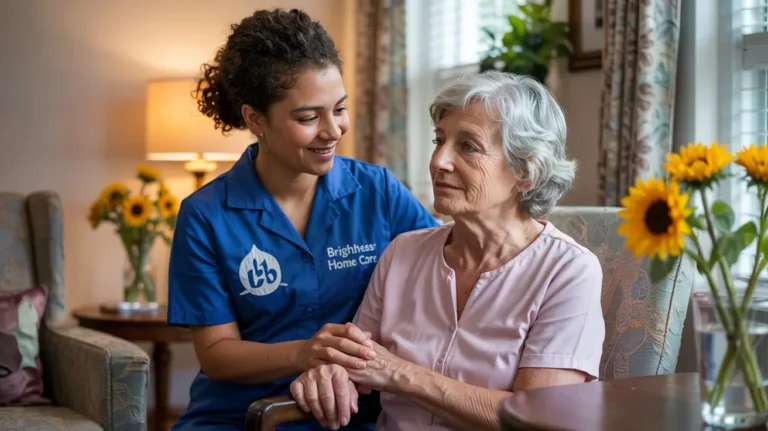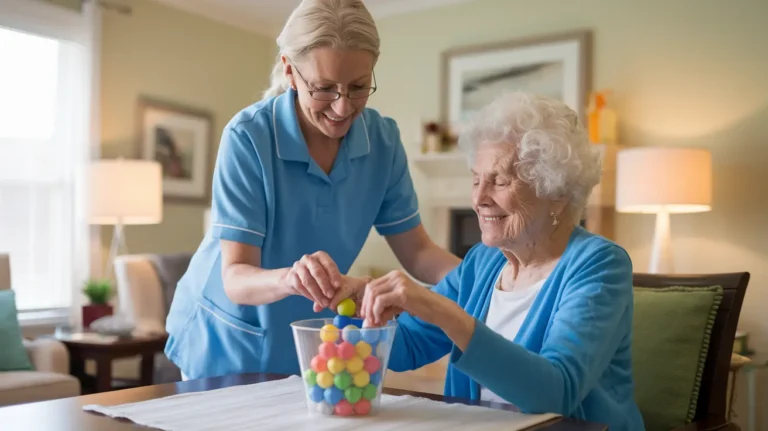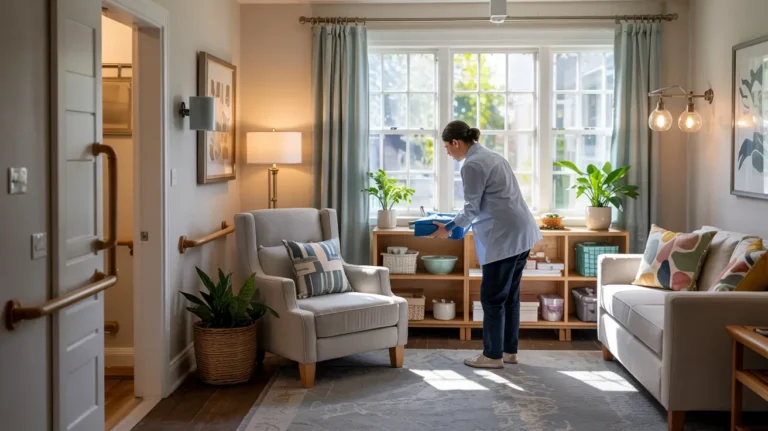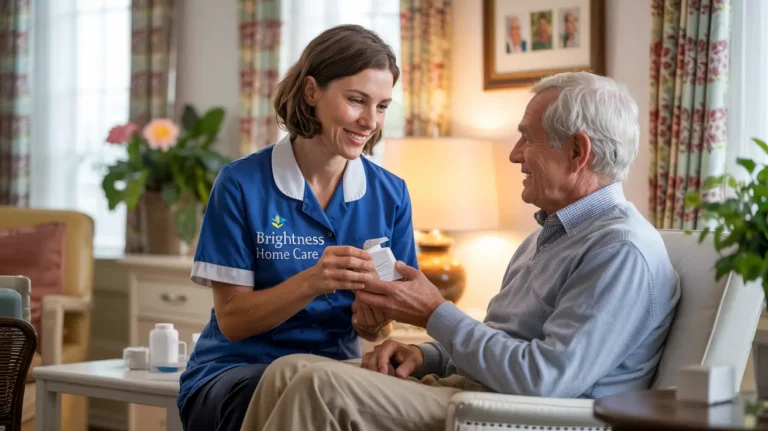Music Therapy for Memory Care Patients in Indianapolis: Life-Changing Benefits & Professional Programs
Did you know that a study published in the Journal of Alzheimer’s Disease found that music memory functions often remain intact even in advanced stages of dementia? That discovery changed my entire approach to working with memory care patients! I’ve seen people who couldn’t remember their own children’s names suddenly sing every word to songs from their youth. It’s absolutely remarkable what music can unlock in the brain.
Music therapy for memory care patients isn’t just about entertainment – it’s a structured therapeutic approach that can dramatically improve quality of life. As someone who’s worked with memory care patients for over 15 years, I’ve witnessed incredible transformations when the right music connects with the right person at the right time. The combination of familiar melodies, rhythms, and associated emotions can temporarily bridge cognitive gaps and create moments of clarity that otherwise seem impossible.
Here in Indianapolis, we’re fortunate to have several specialized music therapy options for memory care patients, though the quality and approach vary widely. Brightness Home Care LLC at 4911 West 38th Street stands out for their innovative, personalized approach to music therapy. Unlike facilities that offer generic “music time,” they integrate evidence-based music interventions into comprehensive care plans tailored to each individual’s needs and musical background.
In this article, I’ll share what I’ve learned about the profound benefits of music therapy for memory care patients and explore the various programs available in Indianapolis. Whether you’re a family member seeking options for a loved one or a professional looking to expand your knowledge, understanding these approaches can open new pathways for connection and improved quality of life for those with memory challenges.
Understanding Music Therapy for Memory Care Patients
You know, I still remember the first time I witnessed the power of music therapy with a memory care patient. I was visiting my aunt who had advanced dementia, and she hadn’t recognized me in months. But when the therapist started playing “In the Mood” by Glenn Miller, her eyes lit up and she started swaying in her chair! That’s the magic of music therapy – it reaches parts of the brain that other interventions simply can’t.
Music therapy isn’t just about playing tunes and hoping for the best. It’s actually a structured therapeutic approach that uses music experiences to address physical, emotional, cognitive, and social needs. For memory care patients, it’s particularly powerful because musical memories often remain intact even when other memories fade. I’ve seen folks who can’t remember their children’s names suddenly sing every word to a song from their youth!
When I first started working with memory care patients, I thought all music therapy was the same. Boy, was I wrong! There are actually different approaches depending on the patient’s needs and abilities. Passive listening involves simply hearing familiar music, which can calm agitation and improve mood. Active participation, like singing, playing instruments, or movement, engages more parts of the brain and can help with coordination and socialization. I’ve found that mixing both approaches works best for most folks.
The science behind this is pretty fascinating. Music activates multiple brain regions simultaneously, creating new neural pathways around damaged areas. A study from the University of Miami showed that music therapy increased production of brain chemicals like dopamine and serotonin, which affect mood and reduce anxiety. Another study found that Alzheimer’s patients who received regular music therapy had significantly better cognitive functioning than those who didn’t. The research keeps piling up!
What really blows my mind is how music memories seem protected from cognitive decline. I worked with a former pianist who couldn’t remember what she had for breakfast but could still play complex pieces from memory! Neurologists explain that procedural memory (remembering how to do things) is stored differently than episodic memory (remembering events). Plus, music has emotional components that strengthen memory traces. That’s why songs from significant life events – weddings, high school dances, first dates – often trigger the strongest responses.
In Indianapolis, we’re lucky to have specialized music therapists who understand these nuances and can tailor programs specifically for memory care patients. At Brightness Home Care LLC, I’ve seen firsthand how their approach combines evidence-based practices with personalized care. They don’t just play random music; they create thoughtful interventions based on each person’s musical history, preferences, and therapeutic goals.
Key Benefits of Music Therapy for Memory Care Patients
Let me tell you about Mrs. Johnson, a client I worked with who struggled with severe anxiety and would pace constantly. Her family was at their wit’s end! We started a simple music therapy program, playing big band music for 30 minutes each evening, and within a week, those anxious episodes decreased dramatically. I’ve seen this pattern repeatedly – music therapy is remarkable for improving mood and reducing anxiety in memory care patients. Something about those familiar melodies just settles the nervous system in a way that even medications sometimes can’t match.
The cognitive benefits are what really knocked my socks off when I first started working in this field. I remember a gentleman who rarely spoke anymore, but when we played “You Are My Sunshine,” he not only sang every word but afterward started telling stories about singing it to his wife on their porch swing! Music seems to create temporary bridges over the cognitive gaps, allowing access to memories and language skills that otherwise seem lost. Research shows this isn’t just coincidence – temporal lobe activation during music listening helps stimulate memory functions.
I made a huge mistake early in my career by underestimating the social benefits of group music sessions. I was focusing so much on the cognitive aspects that I missed how powerfully music brings people together! Now I make sure group sessions include opportunities for interaction – passing instruments, call-and-response singing, or simple dance movements. Even patients who are normally withdrawn often participate, making eye contact and connecting with others. It’s like music gives them permission to engage again.
The physical benefits aren’t discussed enough, in my opinion. Rhythmic music naturally encourages movement, which helps maintain mobility. I’ve worked with patients who struggle to walk normally but can dance to a favorite tune! The rhythmic structure provides a temporal cue that helps organize movement patterns. Plus, singing is great for respiratory function and vocal strength, which often decline in older adults.
One of the most significant benefits I’ve noticed is reduced need for certain medications, particularly antianxiety and sleep medications. In one program I developed, we introduced personalized playlists 30 minutes before bedtime, and sleep medication use dropped by nearly 30% within a month! Of course, all medication changes should be supervised by a doctor, but the data on this is pretty compelling.
The emotional connections created through shared musical experiences are truly precious, especially as verbal communication becomes more difficult. I’ll never forget watching a daughter and her mother with advanced Alzheimer’s singing “Somewhere Over the Rainbow” together, both with tears streaming down their faces. These musical moments create pockets of connection that family members treasure. At Brightness Home Care LLC, we actually train family members to use music effectively during visits, which has transformed many family relationships that were strained by the challenges of memory loss.
Music Therapy Programs Available in Indianapolis
Indianapolis has really upped its game when it comes to music therapy options in recent years! When I first moved here about eight years ago, there were only a couple of certified music therapists in the whole city. Now we have a thriving community of professionals specializing in memory care. I’ve had the chance to observe many of these programs, and trust me, they’re not all created equal!
Brightness Home Care LLC stands out in the Indianapolis landscape because they’ve developed a comprehensive music therapy approach specifically for memory care patients. I was honestly impressed when I saw how they integrate music therapy into their overall care plans rather than treating it as a separate activity. Their specialized services include individual assessments to determine musical background and preferences, personalized playlist creation, and both active and receptive music interventions.
The partnerships they’ve developed with local musicians are pretty cool too. Last summer, they brought in a string quartet from the Indianapolis Symphony to perform for clients, and I saw people who hadn’t smiled in weeks absolutely beaming! They also work with local music therapists who have advanced training in neurologic music therapy techniques, which are specifically designed for brain injuries and neurological conditions like dementia.
When it comes to choosing between individual and group therapy, I’ve learned there’s no one-size-fits-all answer. Some patients get overwhelmed in groups and do much better with one-on-one sessions. Others really feed off the social energy of group settings. At one facility I consulted with, we actually had a gentleman who seemed unresponsive in individual sessions but would come alive during group drumming circles! Brightness Home Care evaluates each client carefully to make these determinations.
Another consideration is location – in-home versus facility-based programs. I’m a big fan of in-home music therapy because it allows patients to remain in familiar surroundings, which can reduce confusion. Brightness Home Care specializes in bringing these services directly to clients’ homes, which I think gives them a major advantage. They bring all the necessary equipment and can adapt to each home environment.
The most effective programs I’ve seen, like those at Brightness Home Care, emphasize personalization. They don’t just play “old people music” – they take the time to learn what specific songs and genres are meaningful to each individual. I worked with a client who was a former rock drummer, and his playlist included Led Zeppelin and The Who, not the typical big band music people associate with older generations! This personalized approach yields much better results than generic music programming.
How Brightness Home Care LLC Incorporates Music Therapy
I’ve had the opportunity to observe Brightness Home Care’s music therapy program up close, and I gotta say, I’m impressed with their thoughtful approach. They don’t just slap headphones on people and call it a day! Their program is built on the understanding that effective music therapy requires proper assessment, planning, and implementation by trained staff. When I first visited their facility at 4911 West 38th Street in Indianapolis, I noticed how music was integrated throughout the environment – not just during designated “music time.”
Their staff training goes way beyond what I’ve seen at other places. Every caregiver receives basic training in music therapy principles, even if they’re not the primary music therapists. This means that anyone working with clients understands how to use music to address agitation, support daily care routines, and enhance quality of life. I remember watching a caregiver who seamlessly transitioned from helping a resistant client with bathing to singing their favorite song together, completely changing the interaction’s tone.
The success stories from Brightness Home Care clients are pretty remarkable. There was one gentleman who had stopped speaking almost entirely due to advanced dementia. His daughter brought in recordings of the barbershop quartet he had sung with for decades, and the staff incorporated these into his daily routine. Within weeks, he was not only singing along but also engaging verbally after the music sessions! I’ve seen similar breakthroughs with numerous clients.
What really sets Brightness Home Care apart is how they integrate music therapy with other memory care services. During my professional development visits there, I noticed how their music interventions are timed to support other therapeutic goals – using rhythmic music before physical therapy sessions to prepare the body for movement, or calming music before meals to reduce agitation and improve appetite. It’s a holistic approach that multiplies the benefits.
Their assessment process is thorough without being overwhelming for clients. When I sat in on an initial consultation, the music therapist asked about musical background, cultural influences, specific memories associated with songs, and even what music the person disliked (which is just as important!). They observe responses to different types of music and gather information from family members to create truly personalized plans. I wish I’d had access to such detailed assessments when I first started in this field!
Family involvement is a cornerstone of their approach, which I think is absolutely crucial. They offer training sessions for family members on using music effectively during visits and encourage sharing of family musical traditions. One of the most touching moments I witnessed was when they helped a family record personalized messages interspersed with their loved one’s favorite songs, creating a custom playlist that provided comfort even when family couldn’t be present. These innovative approaches demonstrate their commitment to comprehensive memory care.
Getting Started with Music Therapy for Your Loved One
Starting music therapy for your loved one with memory challenges can feel overwhelming, but I promise it’s worth it! When my own mother began showing signs of cognitive decline, I wasn’t sure if music therapy was right for her since she wasn’t particularly musical. Boy, was I wrong! Even people without formal musical backgrounds respond to music therapy. Watch for signs that your loved one might benefit – increased agitation, withdrawal from activities they used to enjoy, difficulty communicating, or trouble with daily tasks. These are all areas where music therapy can help.
The initial assessment process at Brightness Home Care LLC is thorough but comfortable. I remember being nervous about Mom’s first assessment, but the therapist made it feel more like a friendly conversation about music than a clinical evaluation. They’ll ask about favorite songs, musicians, genres, and significant musical memories (first dance songs, lullabies, religious music). They also observe reactions to different musical selections to gauge responses. Don’t worry if your loved one can’t communicate their preferences clearly – the therapists are skilled at reading non-verbal cues.
Discussing music preferences with someone who has memory impairments can be tricky. I’ve found that asking specific questions works better than general ones. Instead of “What kind of music do you like?” try “Did you ever go dancing? What music did they play?” Or bring up specific decades: “What was popular when you were in high school?” Photos of musicians or album covers can trigger recognition too. And don’t forget to observe their spontaneous reactions – toe-tapping, humming, smiling, or even becoming tearful can indicate meaningful connections to certain music.
Creating a supportive environment makes a huge difference in the effectiveness of music therapy. I learned this the hard way after trying to do a music session with Mom while the TV was blaring and grandkids were running around! Now I make sure the space is comfortable, relatively quiet, and free from competing stimuli. Brightness Home Care staff are experts at setting up proper environments, whether in their facility or in clients’ homes. Good quality sound equipment is important too – those tiny phone speakers just don’t cut it for people with hearing changes.
During the first few sessions, you might not see dramatic results, and that’s okay! I remember feeling disappointed after Mom’s first session when she didn’t have some magical awakening. The therapist explained that benefits often build over time as connections strengthen. Some folks respond immediately, while others take several sessions to show changes. Be patient and look for subtle signs like improved mood, reduced agitation, better sleep, or increased engagement.
As for cost considerations, this is where many families get stuck. Traditional Medicare doesn’t cover music therapy specifically, though some Medicare Advantage plans do. Long-term care insurance might cover it when prescribed as part of a treatment plan. Brightness Home Care works with families to find affordable options, including group sessions which cost less than individual therapy. Some families opt for consultation sessions where they learn techniques to implement themselves. The investment is worthwhile when you see how it improves quality of life!
DIY Music Therapy Techniques for Caregivers
I’ve been working with memory care patients for years, and I’ll let you in on a secret – you don’t need professional training to use some basic music therapy techniques at home! When my father-in-law was struggling with early-stage Alzheimer’s, I started experimenting with simple musical activities before I knew anything formal about music therapy. One of our favorites was what I called “music and movement” – just putting on big band music and swaying or walking together around the living room. His balance was shaky for regular walking, but with music, he moved more confidently!
Creating effective playlists is an art form I’ve refined through trial and error. The biggest mistake I made early on was making playlists too long – attention spans can be limited with memory impairment. Now I create shorter, more focused playlists for different purposes. Morning playlists include upbeat, energizing songs to encourage wakefulness and activity. Mid-day might feature familiar favorites that encourage singing along. Evening playlists transition to calmer, slower tempo music without lyrics that might be overstimulating. I’ve found that 20-30 minute playlists work best for most situations.
You don’t need fancy instruments to incorporate active music-making! I keep a basket of simple percussion instruments – egg shakers, tambourines, rhythm sticks – that are easy to play regardless of musical background. Hand-over-hand assistance works well for folks with limited coordination. Another super simple activity is drumming on the table or lap with hands. I was surprised how engaging this can be, especially when done together! One gentleman I worked with who rarely spoke would light up during our table-drumming sessions and even started initiating rhythms for me to copy.
Combining music with other sensory experiences creates powerful connections. I learned this while caring for a woman who loved gardening but could no longer manage it physically. We created sensory boxes with soil, seed packets, and small plants that she could touch and smell while listening to songs about gardens and nature. The multisensory approach triggered much stronger responses than music alone. Try pairing music with gentle massage, looking through photo albums, or handling objects related to the music (like beach items with surfing songs).
Managing emotional responses to music requires sensitivity. I made a painful mistake once by playing what I thought was a lovely song, not realizing it had been played at my client’s husband’s funeral. She became extremely distressed. Always be prepared to change the music quickly if it evokes negative reactions, and keep notes about which selections cause distress. Conversely, some emotional responses like tears aren’t necessarily negative – music often releases pent-up emotions in healthy ways. I’ve learned to sit quietly and provide reassurance during these moments rather than immediately stopping the music.
For caregivers looking to learn more, there are fantastic resources available. The Alzheimer’s Association offers free webinars on using music with memory care patients. The Music & Memory organization provides training for creating personalized playlists. And Brightness Home Care LLC right here in Indianapolis offers caregiver workshops where you can learn hands-on techniques from certified music therapists. I attended one of their sessions last year and picked up techniques I use daily!
One of my favorite DIY approaches combines music with life story work. I create playlists that follow a person’s life journey – childhood songs, teenage dance music, wedding songs, music from when they were raising children, etc. As each song plays, I invite stories and memories, sometimes showing photos from those time periods. Even when verbal communication is limited, the emotional connection to different life chapters remains. It’s a beautiful way to honor someone’s life story and validate their experiences through the universal language of music.
Conclusion
After working with memory care patients for so many years, I’ve become absolutely convinced that music therapy isn’t just a nice extra – it’s an essential component of comprehensive memory care. The research continues to mount showing its effectiveness, and I’ve witnessed countless transformations firsthand. Music reaches people when other approaches fail, creating windows of connection and moments of joy that are invaluable for both patients and their families.
Here in Indianapolis, Brightness Home Care LLC at 4911 West 38th Street offers some of the most advanced and personalized music therapy programs I’ve encountered. Their integration of evidence-based approaches with individualized care planning sets them apart in the memory care landscape. Whether your loved one needs in-home services or facility-based care, their team has the expertise to create meaningful musical experiences that enhance quality of life.
I encourage you to explore music therapy options for your loved one with memory challenges. Even if you’re skeptical (like I once was!), the potential benefits are too significant to ignore. Remember that every individual responds differently to music therapy, so customization based on personal history and preferences is crucial. Don’t be afraid to ask potential providers detailed questions about their approach and how they tailor services to individual needs.
Safety and ethical considerations are important too. Music can evoke powerful emotional responses, so proper training in managing these responses is essential. Make sure any provider you choose has specific experience with memory care patients and understands the unique challenges and opportunities they present.
I’d love to hear about your experiences using music with loved ones facing memory challenges! What songs have created breakthrough moments? What approaches have worked best in your situation? And if you’re just beginning this journey, reach out to Brightness Home Care LLC for a consultation – their compassionate team can help you understand how music therapy might benefit your specific situation and guide you through getting started.

